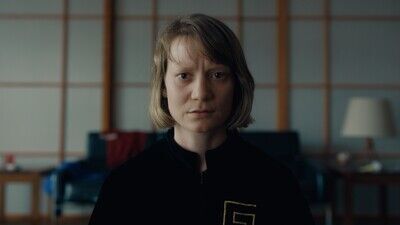Every young person has that longing to find a meaning in life. A lot of adults, also—when you become older, you’re so busy getting your day organized that you forget to ask yourself, “Why am I doing this?” I’ve had young adults in previous films of mine because I find it interesting that moment in life when you’re still open, when you’re still trying to find your position. So, for me as a filmmaker, it’s a great opportunity to question certain positions.
My film does not judge and say, “This is right and this is wrong, and they are the good ones and they are the bad ones.” That’s the weird thing about “Club Zero”: You have to choose as an audience what you think of it. And at some point, the way those young people start to believe in Miss Novak and her ideas has a lot to do with their urge to change [things], to really make a difference—but that’s also threatening us older adults, because we have become used to our life. But the younger people still question it, and of course it’s exaggerated [in the movie]—you have to eat to live—but what if those young people have decided that it is more important to change the world than to just live? Maybe they’re willing to give their lives. It’s not a film about saying they don’t understand that you have to eat—that’s not the point. The point is maybe they do understand that it’s threatening their lives, and they still do it.

Your films are often called “provocative.” Would you describe yourself as a provocative person when you were young? Were you a troublemaker at school?
I was always questioning things, but I wasn’t causing a lot of trouble. I was a very good student—I had very good grades, and I did everything on time—but I questioned the teachers, and this was, for some of them, quite annoying. [Laughs] I remember that they asked my parents to come to school, but they couldn’t complain about my grades, because I had good grades—they complained about me asking endless questions and questioning what they say all the time.
That is something that I still have that’s still annoying people, but I’m questioning those things that we all think [are] certain. It never convinced me [that I should] accept that this should be the truth—I always try to find the other side of it.
You are often put in the same cinematic camp as button-pushing artists like Michael Haneke, Ulrich Seidl and Lars von Trier. Is that where you put yourself?
I’m sure that makes me part of a group. But on the other hand, I do think that the female perspective that I have is something that I couldn’t find in many male directors that otherwise I would appreciate. So I do feel a little bit more related to filmmakers like Maya Deren—she inspired me a lot, especially when I was a young student in film school and we only were taught male directors’ films. They pretended that there were no women! [Laughs] Later, I found out that there were women, and then I was really shocked. I thought, “I’m going to sue the film academy because they lied to us! This was not part of the curriculum!”

